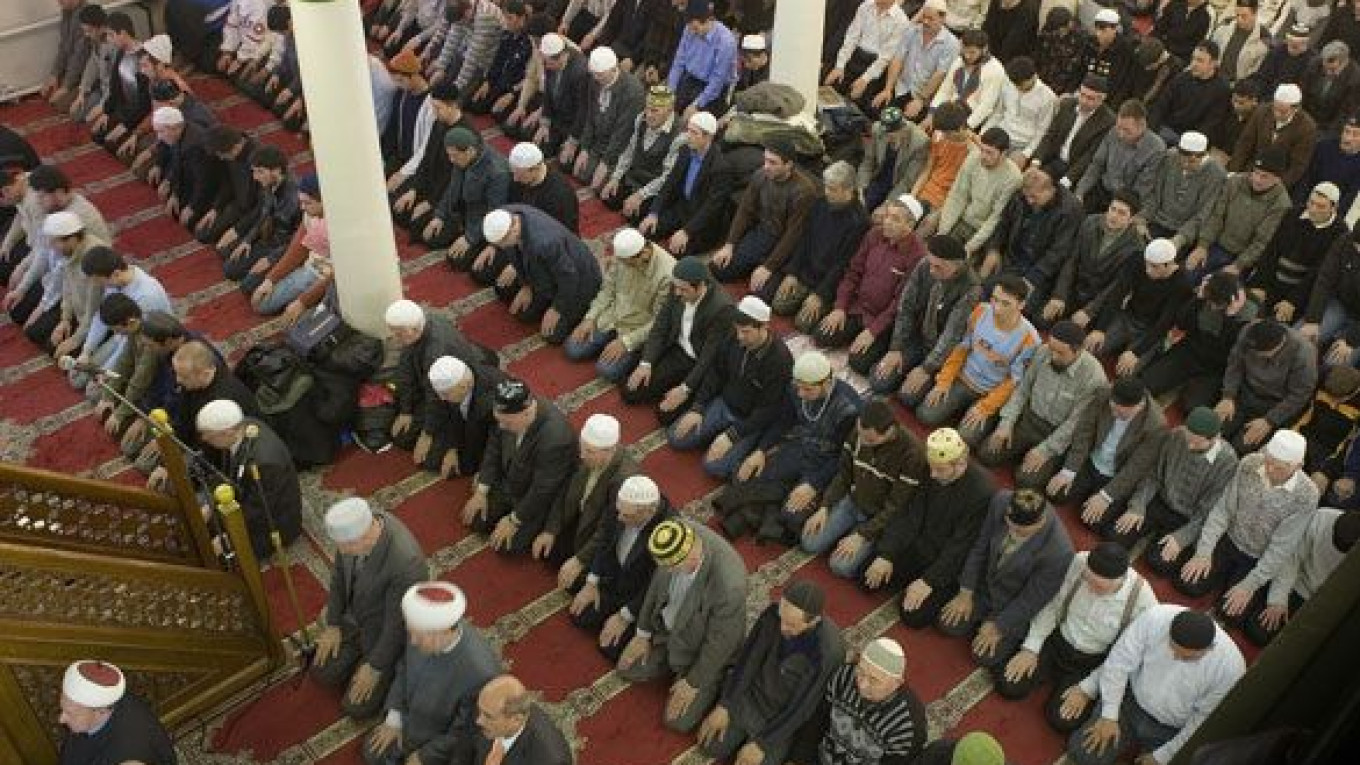A dispute has escalated over plans to build a mosque in Moscow's southeastern outskirts, with local residents vowing to send an appeal with about 2,000 signatures to President Dmitry Medvedev and nationalist groups promising to support them.
Muslim leaders defend the need for the worship site, saying the capital's four mosques are overflowing with people.
Residents of the Tekstilshchiki district in southeastern Moscow will send Medvedev a complaint signed by more than 1,800 people opposing construction of the mosque, mainly on the grounds that it might cause massive traffic jams in the area on Islamic holidays, activist Mikhail Butrimov told The Moscow Times on Friday. Butrimov leads the movement Moi Dvor, or My Yard, which supports residents in their fight against the mosque.
Butrimov said residents asked local authorities several years ago to build a Russian Orthodox chapel or create a park on the unused lot. But authorities banned construction on the plot, saying utilities ran underneath it, he said.
The proposed site on Volzhsky Bulvar covers half a hectare with some trees and grass. Locals push their children in strollers and walk their dogs there, and people would benefit more if a park were seeded there, Butrimov said.
Local residents staged a park-founding ceremony at the disputed site by planting 15 young maple trees there Sunday, Interfax reported.
Two ultranationalist groups, the Movement Against Illegal Immigration, or DPNI, and the Russian Public Society, pledged their support to the residents at a joint news conference Friday.
"DPNI will check whether the documents authorizing the mosque's construction are legal and do everything to attract maximum public attention to the case," DPNI spokeswoman Alla Gorbunova said by telephone.
Amid the outcry, Vladimir Zotov, prefect for the Southeastern Administrative District, has backtracked on his previous support for the project. Zotov wrote in a May 2009 letter to Mayor Yury Luzhkov that construction of the mosque on the land would contradict a 2004 order from City Hall but that he considered the construction "rational" after consulting with city officials.
Last Wednesday, however, Zotov told RIA-Novosti that "the mosque can't be built until the consent of the residents is obtained."
Traffic jams have been a main fear of residents. If a mosque goes up, "no one will be able to drive past it on holidays," Butrimov said.
In fact, Moscow's mosques are surrounded by Friday traffic jams as worshippers arrive for prayers, the imam for Memorial Mosque on Poklonnaya Gora told Vesti FM radio last week, Interfax reported.
There are up to 1.5 million Muslims in Moscow, which has a population of roughly 10 million, said Gulnur Gaziyeva, a spokeswoman for Russia's council of muftis. On Islamic holidays, up to 100,000 people fill the capital's mosques.
"It is goes without saying that a new mosque is needed," Gaziyeva said.
Butrimov said the new mosque would accommodate 3,000 to 5,000 people.
Gaziyeva countered that it would be smaller, although she could not specify the number of worshippers that it would accommodate.
City authorities have been searching for a location for a new mosque for several years, Gaziyeva said. Luzhkov approved the unused lot in Tekstilshchiki for the construction in June, the web site for the southeastern district said.
"Of course, any construction will always be an inconvenience to local residents, and we understand that," Gaziyeva said.
"But Moscow residents have to understand that it is better that Muslims go to a mosque than to an informal missionary who can preach something wrong," she said, referring to radical Islamists.
Many young Muslims who are "separated from their parents" arrive in Moscow, and "the only teacher who can make sure that they don't go the wrong way is an imam," Gaziyeva said.
A Message from The Moscow Times:
Dear readers,
We are facing unprecedented challenges. Russia's Prosecutor General's Office has designated The Moscow Times as an "undesirable" organization, criminalizing our work and putting our staff at risk of prosecution. This follows our earlier unjust labeling as a "foreign agent."
These actions are direct attempts to silence independent journalism in Russia. The authorities claim our work "discredits the decisions of the Russian leadership." We see things differently: we strive to provide accurate, unbiased reporting on Russia.
We, the journalists of The Moscow Times, refuse to be silenced. But to continue our work, we need your help.
Your support, no matter how small, makes a world of difference. If you can, please support us monthly starting from just $2. It's quick to set up, and every contribution makes a significant impact.
By supporting The Moscow Times, you're defending open, independent journalism in the face of repression. Thank you for standing with us.
Remind me later.


